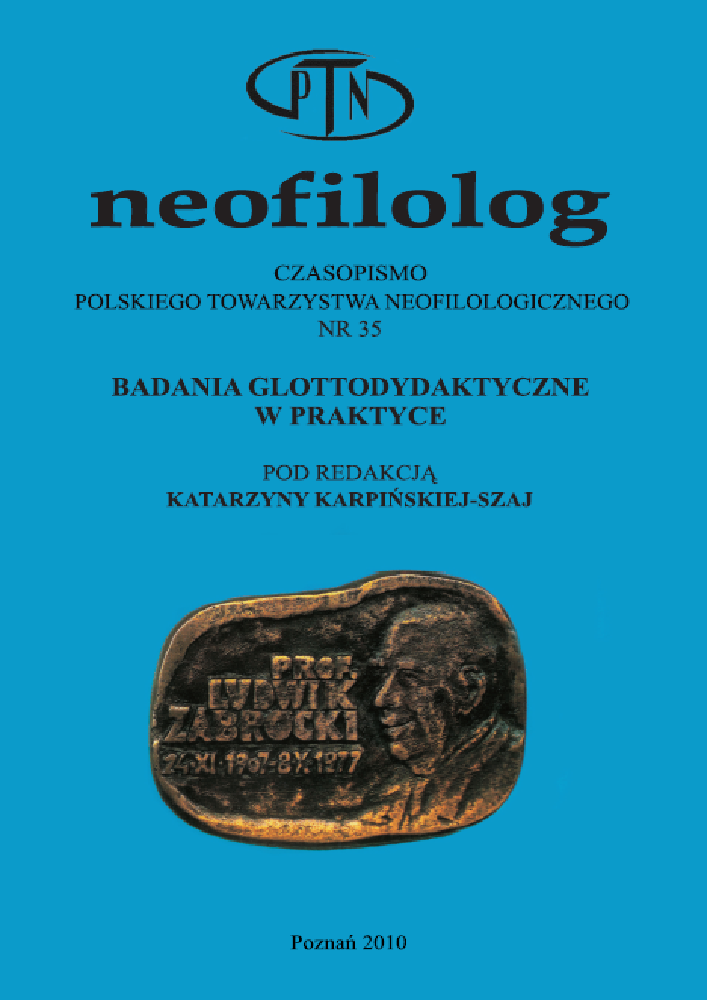Abstrakt
Some of the solutions employed in the field of teaching languages for special purposes have turned out to be useful also in the field of general didactics, e.g. the task-oriented approach. What is particularly valuable in the legacy of teaching languages for special purposes is its eclectic nature, which gives one the possibility to choose and combine the best-tested methods depending on the individual characteristics of every learner. Such an undogmatic approach and search for the best possible technique, which takes into account individual characteristics of each student, appears to be a particularly valuable and enriching one in the days of certain reluctance towards an overtly rigidly defined concept of communicative approach in foreign language teaching.
Bibliografia
Ardouin, T. 2003. Ingénierie de formation pour l’entreprise: analyser, concevoir, réaliser, évaluer. Paris: Dunod.
Beacco, J.-C. et Lehmann, D. (dir.). 1990. Publics spécifiques et communication spécialisée, Le Français dans le monde no spécial. Paris: Hachette coll. F.
Brunot, F. 1966. Histoire de la langue française, des origines à nos jours. Paris: Colin.
Carras, C. et al. 2007. Le Français sur objectifs spécifiques et la classe de langue. Paris: CLE International.
CREDIF. 1966. Vocabulaire d’initiation aux études agronomiques. Paris: Didier.
Denyer, M. 2006. « La perspective actionnelle définie dans le CECR et ses répercussions dans l’enseignement des langues » (w) Première rencontre Diffusion-FLE. La perspective actionnelle: Tâches et projets, 9-16; http://allemand.scola.ac-paris.fr/CECR-eval/perspective%20actionnelle.pdf DW 22.01.2009.
Germain, C. 1993. Evolution de l’enseignement des langues: 5000 ans d’histoire. Paris: CLE International.
Hutchinson, T. & Waters, A. 1987. English for Specific Purposes. Cambridge University Press.
Kahn, G. 1990. « Un manuel pour l’enseignement du français aux militaires indigènes, 1927 » (w) Beacco, J.-C. et Lehmann, D. (red.) 1990.
Le Boterf, G. 1990. L’ingénierie et l’évaluation de la formation. Paris: Editions d’Organisation.
Janowska, I. 2008. „Zadaniowy scenariusz jednostki metodycznej”. Języki Obce w Szkole 3/2008: 43-51.
Lehmann, D. 1993. Objectifs spécifiques en langue étrangère. Les programmes en question. Paris: Hachette coll. F.
Mourlhon-Dallies, F. 2008. Enseigner une langue à des fins professionnels. Paris: Didier coll. Langues & Didactique.
Perrichon, E. 2008. Agir d’usage et agir d’apprentissage en didactique des langues – cultures étrangères, enjeux conceptuels, évolution historique et construction d’une nouvelle perspective actionnelle. Thèse de doctorat, Université Jean Monnet de Saint Etienne; http://www.aplv-languesmodernes.org/spip.php?article2029& var_recherche=Perrichon DW 18.02.2009.
Phal, A. (dir.). 1971. Vocabulaire général d’orientation scientifique. Paris: Didier.
Porcher, L. 1977. « Une notion ambiguë: les besoins langagiers ». Les cahiers du Crelef 3, Université de Franche Comté.
Rada Europy. 2003. Europejski System Opisu Kształcenia Językowego: uczenie się, nauczanie, ocenianie. Warszawa: Wydawnictwa Centralnego Ośrodka Doskonalenia Nauczycieli.
Richterich, R. 1985. Besoins langagiers et objectifs d’apprentissage. Paris: Hachette coll. F.
Szulc, A. 1994. Słownik dydaktyki języków obcych. Warszawa: Wyd. Naukowe PWN.
Licencja
Prawa autorskie (c) 2020 Elżbieta Gajewska, Magdalena Sowa

Utwór dostępny jest na licencji Creative Commons Uznanie autorstwa – Bez utworów zależnych 4.0 Międzynarodowe.
Przedstawiany utwór (artykuł) upubliczniany jest na podstawie umowy z autorem i na licencji Creative Commons Attribution-NoDerivatives 4.0 International (CC BY-ND 4.0).
Użytkownicy mają obowiązek podania wraz z rozpowszechnionym utworem, informacji o autorstwie, tytule, źródle (odnośniki do oryginalnego utworu, DOI) oraz samej licencji;
- bez tworzenia utworów zależnych,
- utwór musi być zachowany w oryginalnej postaci.
Uniwersytet im. Adama Mickiewicza w Poznaniu zachowuje prawo do czasopisma jako całości (układ, forma graficzna, tytuł, projekt okładki, logo itp.).
